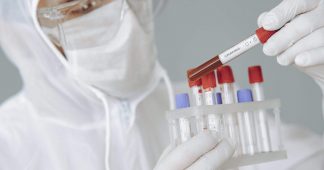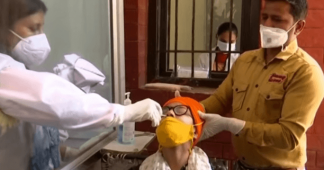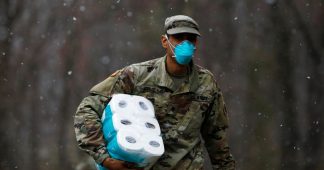By Robert Stevens
Mar 21, 2022
The Omicron BA.2 sub-variant is fuelling a resurgence of COVID cases and deaths in Britain. According to the Office for National Statistics (ONS) an estimated one in every 20 people were infected with the disease last week. COVID infections are increasing among every sections of the population, including the most vulnerable 75 years and over.
BA.2 was only discovered in India and South Africa in late December 2021. By mid-January, the UK Health Security Agency designated it a “variant under investigation” after 1,072 cases were identified in England. The highly transmissible strain became dominant in the UK within a month, making up 52 percent of all Covid infections in Britain in the week to February 20. Just two weeks prior BA.2 accounted for just 19 percent of all cases. As of March 11, the variant was already accounting for more than 80 percent of cases in England.
Last Thursday, the UK passed a grim milestone of 20 million people infected. This is just short of 30 percent of the entire population. According to the ONS, a total of 187,261 deaths have occurred where COVID-19 is mentioned on the death certificate.
Such hellish figures have been all but excluded from the national media, with only the Sun newspaper bothering to report the 20 millionth case.
The media is on board with Prime Minister Boris Johnson’s declared policy of “Living with COVID-19”. The fact is, as scientists and the WSWS predicted, for many this means “Dying with COVID-19”.
Since “Living with COVID-19” was published February 22, according to official figures, a further 4.33 million people have been infected and 2,663 people have died. The government only records COVID deaths if a person dies within 28 days of testing positive.
In the seven days to March 18, 552,198 people were infected nationally, up 152,378 and a nearly 40 percent increase on the week prior. Deaths are beginning to rise again, with the 752 recorded in the same week, up 3 percent on the week prior.
Last Friday, all remaining travel restrictions were lifted for passengers entering the UK. Vaccinated people have not had to take tests for months on arrival. Now even the unvaccinated don’t have to, and passenger locator forms have ended. The UK’s largest airport, Heathrow, has done away with the requirement for people to wear facemasks in its terminals, railway stations or office buildings.
With no impediments to the spread of COVID, its resurgence was inevitable. In parts of the country it is once again out of control. In Essex, a county adjacent to London with a population of almost 1.5 million, 57 COVID “blackspots” were recorded last week. These are classed as areas with an infection rate above 800 cases per 100,000 residents. Essex Live reported that in the seven days to March 12, “12 neighbourhoods across the county… recorded some of the highest infection rates in the UK, with infections above 1,000 per 100,000 residents. The neighbourhoods, located in the districts of Maldon, Colchester, Tendring and Braintree, have all recorded a huge number of Covid-19 cases from March 5 until March 12. This is almost double the UK average of Covid cases, sitting at 684.6 cases per 100,000 residents.”
The increase in infections is again having a terrible impact on the National Health Service (NHS) and its workers. In the week of March 7, according to NHS data, 123,055 staff were off sick with COVID-related illness—up from 103,753 the week before. Many have likely been ill for a long time, suffering with Long COVID. The Independent reported, “NHS data on Covid related staff sickness does not differentiate between staff off sick due to symptoms of Long Covid and those off with recent illness.”
The fall in the number of staff available in the NHS’s one million workforce takes place amid a spike in hospitalisations. The newspaper reported that hospital admittance across the south west of England, “shot up 726 to 1,066 during the same period.” Last Thursday, March 17, the number of people with COVID-19 in UK hospitals reached 13,548—the highest figure for five weeks. This included 280 people who required ventilators. This was a rise of over 1,500 people requiring hospitalisation in just three days.
Schools are once again primary vectors. The Guardian reported March 5, “According to the latest data from the Office for National Statistics, 2- to 11-year-olds have the highest rate of infections of any UK age group, with 4.2% testing positive during the week ending 5 March.”
Wales Online reported March 16, “There were 445 coronavirus cases among [Welsh] staff and children in the six days to March 10. That compares with 306 the previous week and 468 the week before that, Public Health Wales data shows. Of the overall total 306 were in primary schools, 97 were in secondaries, and 42 were classed as ‘other’, which includes independent and special schools and pupil referral units.” Cases were “being fuelled by primaries where three times as many pupils are off compared to secondaries.”
Most children in UK primaries remain unvaccinated. Despite the government allowing healthy primary school children to be vaccinated, nothing has been put in place to organise a mass vaccination programme for this cohort.
At Newquay Tretherras secondary school, an “unprecedented situation” was reported with over 30 members of staff off as a result of a positive Covid test on March 14. The school was forced to send two year-groups home. Cornwall Live reported, “This follows previous reports that the school had sent an initial letter to parents and pupils last week (Wednesday, March 9), outlining that there had been a growing number of staff and pupil sickness as a result of an increase in Covid cases throughout the school.”
The Manchester Evening News reported March 16, “Nineteen pupils and seven members of staff, including the head, have tested positive at Woodfield Primary School in Wigan.”
The agenda of the ruling elite in Britain from day one of the pandemic has been that the profits of the corporations must come before the health and lives of the population. This week the Wilco home and garden retailer demanded that its 16,000 staff attend work even if they tested positive for COVID. A workplace policy memo instructed staff, “If you test positive for Covid-19 and feel well you can continue to come to work, if you feel too unwell you can follow the absence policy.” Only after opposition from workers and the public did the company claim a “miscommunication” and withdraw their instructions.
Such policies are being enforced de facto by firms throughout the UK, with the collaboration with the unions. From April 1, companies will no longer need to explicitly consider coronavirus in their risk assessments.
Reporting of daily case numbers is to be ended. A big step towards this is the governments ceasing of funding to the ZOE Covid Study app from the end of this month. The app cost just £5 million to run during the past 18 months.
ZOE runs the world’s largest COVID-19 study, and the app—with four million contributors globally—is able to closely track Covid symptoms and spread of the disease. Its latest data available, for March 18, found there were 305,134 symptomatic cases of COVID in the UK on that date. Co-founder Tim Spector, Professor of Epidemiology at King’s College London, described the decision as “a really bad mistake. Zoe is going to be the tool that protects the UK from the next pandemic and saves the NHS millions as we try and discover ways to prevent major diseases.” The government was “wanting to get rid of data and move on,” he said. “Other surveillance tools have been given the axe, which means we will have less eyes on the ground and radar on the next variant.”
Spector warned last week, “It seems very hard to stop Omicron, especially the new form of it, Deltacron [a new genetic combination with the Delta variant]. It will be going up to 250,000 a day soon.”
Published at www.wsws.org
We remind our readers that publication of articles on our site does not mean that we agree with what is written. Our policy is to publish anything which we consider of interest, so as to assist our readers in forming their opinions. Sometimes we even publish articles with which we totally disagree, since we believe it is important for our readers to be informed on as wide a spectrum of views as possible.












